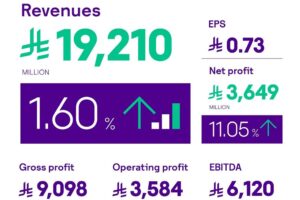STC’s Senior Vice President for Corporate Affairs, Eng. Abdullah Al Kanhal, confirmed that STC’s contribution to local content and technology localization has reached SR 4 billion. Al Kanhal pointed out that the company has worked for nearly a decade to support localization opportunities in various sectors, such as fiber-optic networks and promoting opportunities for citizens in a number of new industries with international and local partners.
During his speech last night at the launch of the Local Content Partnerships Initiative, organized by the Local Content and Government Procurement Authority, Al Kanhal stated that in 2015, STC established InspireU business incubator to support ICT entrepreneurs and entrepreneurs in the region. Today, STC hosts 28 projects with investments reaching 60 million SR, and contributed to the creation of more than 100,000 jobs, including part-time jobs.
 He also added that in 2017, STC launched its own local content strategy through Rawafed program to develop an ambitious and sustainable framework in collaboration with its government and private partners to maximize local content.
He also added that in 2017, STC launched its own local content strategy through Rawafed program to develop an ambitious and sustainable framework in collaboration with its government and private partners to maximize local content.
He pointed out that the program focused on the localization of industry, through developing industry infrastructure locally in the field of industries for the telecommunications and information technology sector in addition to the empowerment of small and medium enterprises.
The program also focused on supporting human resources by raising the Saudization rates in the administrative functions in the ICT sector, as well as promoting innovation.
During the ceremony, STC signed a cooperation agreement with the Local Content and Government Procurement Authority, after joining the Local Content Coordination Council of the Local Content Partnerships initiative, which was launched by the Authority as the first strategic initiative to establish a sustainable partnership with leading national companies and the private sector for content development.
This agreement will increase local content in the Kingdom, which is a key pillar to diversify and direct the national economy according to the Kingdom’s Vision 2030, by enabling local manufacturers and service providers to double their contributions to local content. Therefore, helping the Kingdom become a role model in raising the level of local content and enhancing its contribution to economic development.












